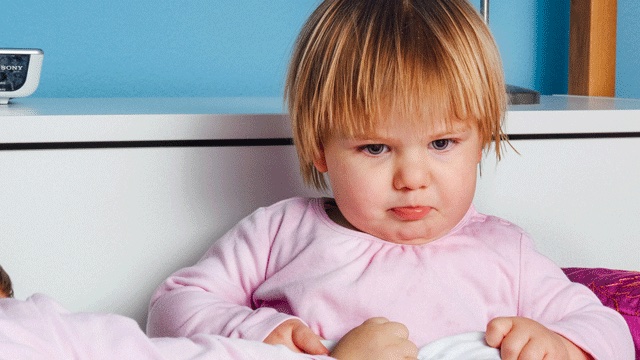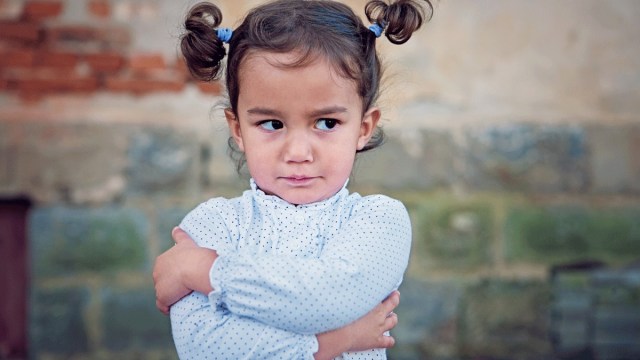Now you did it. You gave your 2-year-old the Elmo cup instead of the Star Wars cup. The battle lines have been drawn. The meltdown seems inevitable. But is it? “Sometimes it can feel like when our kids are tantruming we have to ride it through,” says Abigail Wald, who has helped tens of thousands of parents through her Mother Flipping Awesome parent coaching program as well as her viral videos and podcasts. “But what we do immediately preceding a tantrum can often make the difference between the tantrum happening at all or not.” Saying things like, “It’s okay” or “It’s not a big deal”—those are big no-nos. Trying to smooth things over with a reward? Not a good idea, either.
“Sometimes I like parents to think about it like this: At what point did you stop having meltdowns about little things in life?” Wald suggests. “Now answer that question and then wonder if it was by the age of 3 or 4. Then look at your child and be like—ah… okay.”
Whether you’ve got a headstrong one-year-old or a testy two-nager, these sprouting little people are all about their emotions. It doesn’t matter whether they’re raging because you turned off The Wiggles or because you told them 7 p.m. is too late to go to the playground—those big feelings are real. And how you respond to them can make all the difference. So the next time your child is about to lose it, handle the situation with care, and definitely don’t utter these phrases.

1. “It’s not a big deal” or It’s OK.”
Um, it’s clearly not okay. At least, not in your toddler’s growing brain—where whatever she’s upset about most certainly is a big deal. You telling your child otherwise will only make things worse. “Your child might not feel okay, and the process of your child getting from ‘I’m not OK’ to feeling like, ‘I am OK’—and figuring out how they get there—is the active parenting,” says Wald, who has two teenage sons of her own.
“Telling a child they’re OK when they’re feeling anything but is just gaslighting somebody that you love,” Wald explains. Instead, try to meet your child where they are and acknowledge their disappointment without rushing to make it better.
“Let’s say you just got off a call with a client that you’ve been nurturing for a really long time and they just decided to give their business to another company. Your kid might look at you and say, ‘It’s not a big deal, because we get to go to the zoo today,’ but for you, it might be a big deal. Everybody’s big deal is different.”
Related: The 4 ‘Magic Words’ That Stop Bad Behavior Better Than Warnings
2. “Big boys or girls don’t [cry, whine, etc.].”
Not only have you just insulted your child by telling them they’re not a big boy or girl, but you’ve also set them up for a future where their feelings aren’t okay. Big girls and boys can cry. And we want to make sure our kids know that’s natural and normal.
“It can be very disorienting for a child to think that they’re not going to be able to have their feelings when they grow up,” says Wald. “Let kids have the feelings they’re having in that moment and have good coping skills for whatever age they’re in.” In most cases, telling your kids not to cry (or whine) only makes them cry more. Instead, try to understand why they’re so upset, and tell them you’d love to talk to them about it when they are calm.
3. “If you’re good, you can have [insert reward here].”
We get it. Sometimes it’s easier to pop in a little bribery in order to get out the door, have an easy trip to the grocery store, or enjoy a (somewhat) quiet car ride. But when you offer rewards for “being good,” what you’re telling your kids is that they’re not already good. “Children are always good; that doesn’t mean they’re always making good choices,” Wald says.
Here’s an example: Let’s say you’re looking for your toddler to pick up all the crayons when he’s finished drawing. Wald recommends saying something like,‘Hey, I’m looking for you to be able to pick up all the crayons, and that’s what I’m waiting for so we can go to the park.’”
4. “Your sibling knows how to do this. Why don’t you?”
Sibling rivalry is a real thing, and comparing one child to another just sets the stage for more of it. Every kid has their own timeline, so it doesn’t really matter when or how one child can do something if another is having trouble. Bringing up a sibling will only make your child feel worse about their behavior.
That said, you can use another child’s experience to help when one of your kids is struggling. Wald suggested saying something like, “Your sister struggled with this, too, and then she learned. Maybe we can ask her what helped.” This way, you’re creating a support system instead of a rivalry, while helping solve the problem. Win-win.
Related: 6 Phrases to Avoid Saying to Your Toddler
5. “You’re my easy child.”
You might think it would make your child happy to know you think of them as “easier” than their siblings, but it doesn’t necessarily work that way. “Setting up a child as, ‘Oh, thank goodness you’re easy, you’re less difficult, you’re more compliant’ starts to put a child in a box. They feel like they have to be that way to keep the balance of the family. And that’s not really what we want,” says Wald. Got a favorite? An “easy” child? Keep it to yourself.
6. “What’s wrong with you?”
All your child hears when you say this is: “There’s something wrong with you.” And this proclamation can become a self-fulfilling prophecy—the child feels like the “bad kid,” so starts behaving badly. This can start to set up an identity that’s really unhealthy “as opposed to focusing on choices that have been made in the moment,” says Wald.
Instead of focusing on the child (i.e., “What’s wrong with you?”), focus on the behavior you’re trying to change (i.e., “You just hit your sister and it looks like she’s hurt. What can you do to make things better?”).
7. “You always” or “You never.”
Never say never. These sorts of blanket statements only tell the child who you think they are—which could lead to who they become. You tell your kid, “You never clean your room,” they’ll become a kid who never cleans the room. “You’re coding their brain for who they are and it starts to create, ‘Ok I guess you’re telling me who I am.'”
Instead of saying, “You never clean your room,” say something like, “Let’s work on cleaning your room today” or “We can watch a show once your room is clean.”
Related: The Most Important Things to Say to a Toddler (That Aren’t ‘I Love You’)
8. “Because I said so.”
This one usually sneaks out of our parenting toolbox when we’re tired or just don’t have a better answer. But let’s be real. You know your kids are just going to keep asking “Why?” anyway, so why not just answer them honestly? They want to know why they have to go to bed at 8 p.m. Tell them how important sleep is for their bodies and how many hours they need to sleep so they can grow. If they ask why they can’t watch TV all night long, you tell them it’s because, while TV is fun, there are lots of other things in life that are fun, too, and it’s important to have balance.
“Our kids are in a really hungry learning stage at this age. They’re at a stage where they really want to understand the world. So it’s way better to say something like, ‘Well, the reason that the park closes is because there’s someone who keeps the gate open, and that person has to get home,” Wald says. “Everything is a learning opportunity to teach them how the world works is so much more powerful than, ‘because I said so.’ That builds the growth mindset that they need and the cognitive flexibility that we want them to have. ‘Because I said so’ doesn’t build any of those things.”
9. “Say you’re sorry.”
Your toddler just whacked her big brother in the face with her Barbie doll and won’t budge on the apology. Can you force it? Well, you can try. But they either won’t mean it, or they’ll stubbornly refuse, and then you’ve got your toddler mad at you and her brother. Now what?
Let’s backtrack a bit. Before you rush to apologies, it’s important to find out why a child did something wrong in the first place. “A lot of times they do something wrong because they feel something wrong was done to them,” Wald explains. “You have to figure out why they did the thing they need to apologize for first, then help them understand why they felt the way they did and why maybe the way they handled it was wrong.” Once you have that talk with your child, and they’re at a place where they understand, you can have them “apologize for how they handled it without apologizing for the feeling.”
And, rather than just focusing on a “sorry,” it’s better to call it what it really is—a “repair.” To do this, narrate how the other person looks (“Look at your brother’s sad face; I bet that hurt.” or “Your brother is really upset that you hit him.”), then come up with a way to “repair” the situation (with a hug, an ice pack, etc.). This way, it’s not just about the words, it’s about the actions.
10. “Hurry up and make a choice.”
We get it. Your kid has been perusing the prize box at the doctor’s office for longer than the actual doctor’s visit, and you’re getting impatient. But—as you’ve probably noticed—telling your kid to, “Hurry up” only makes the choice-making take even longer. “When you say ‘hurry up,’ you’re creating stress,” Wald says. “For some people, stress creates action, for many, stress creates a freeze response. Their brain is now just hearing ‘Hurry up’ and now they can’t choose specifically because you just told them to hurry.”
So what’s a harried parent to do? Just take a deep breath and let your kid linger. Any parent who’s waited for their toddler to “do it themselves” when it comes to buckling their own seat belt knows how long those minutes can be. But sit tight. Play a Wordle. They’ll get there. And whatever you do, don’t tell them “It’s not a big deal.”
Related: 8 Ways to Say ‘No’ to Your Kid (Without Actually Saying It)











